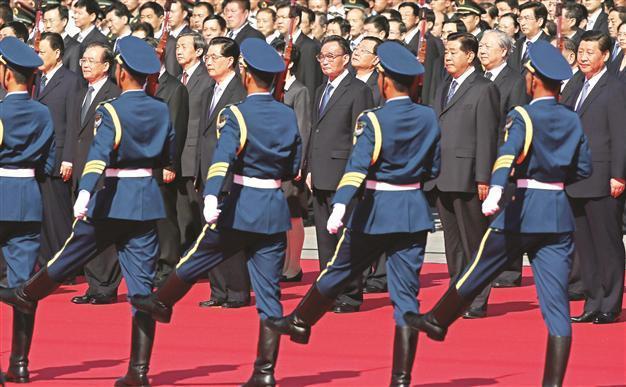China readies for handover
BEIJING

Vice-President Xi Jinping (R), President Hu Jintao (4th R) and PM Wen Jiabao watch honor guards march past during a flower-laying ceremony at Tiananmen Square in Beijing in this file photo. EPA photo
China’s ruling communist elite are preparing for next week’s landmark ceremony where they will transfer power to a younger generation of leaders amid a widening rift within the party.
The policy-setting Central Committee began its final meeting yesterday before Communist Party leader Hu Jintao and others in his government begin to cede power to Vice President Xi Jinping and others at a congress to be held Nov. 8.
The meeting is also expected to condemn the already purged senior official Bo Xilai, who is accused of being involved in covering-up his wife’s murder of a British businessman. Bo’s ousting widened rifts within the leadership, complicating bargaining over the roster of new leaders.
Analysts said the party split between Bo’s backers, who are nostalgic for the revolutionary era of Mao Zedong, and reformers who advocate faster political and economic reforms.
Little else is known about who will fill the cast to run the world’s second-largest economy and observers say candidates are still vying for top positions in a game of intrigue played out beyond the media’s view. According to analysts, between five and seven seats on the party’s elite Politburo Standing Committee, China’s highest decision-making body, are believed to be at stake and up to half of the 25 or so seats on the second-tier Politburo.
List bargainingJoseph Cheng, an expert on Chinese politics at City University of Hong Kong, said senior figures would have drawn up lists of candidates for the positions. “These lists are important because they will effect personnel arrangements for top leaders at the ministries and in the provinces and so on, so these things have to be finalized,” he told Agence France-Presse.
A man once tipped for a senior role who will not be on the lists is Bo, who was stripped of his Parliament seat and lost legal immunity last week, paving the way for him to face trial for corruption and other serious charges. A scandal surrounding him and his administration in the southwestern city of Chongqing, resulting in his wife’s conviction for the murder of a British businessman, has plagued the sensitive leadership transition.
Observers say the affair has split the top leadership, with reformers using it as ammunition to advance their push for democratic remodeling, while conservatives scrambled to shore up the image of a ruling party mired in allegations of corruption. In the absence of competitive elections, the ruling party has over the past 20 years sought to solidify a pattern of leadership transition that is predictable and stable in order to avoid power struggles, Cheng said. “But with the Bo Xilai case, obviously the process has become more competitive and even ugly,” he said.
Further complicating the political landscape is a New York Times report detailing the prime minister’s family’s accumulated assets worth $2.7 billion, in a blow to his self-styled image as a common man leading the fight against graft.
Ahead of the congress, the ruling party has further tightened its already strict censorship of the media and Internet, while cities have been flooded with police and security personnel. Over 1.4 million people have volunteered to help police “maintain stability” in Beijing.
